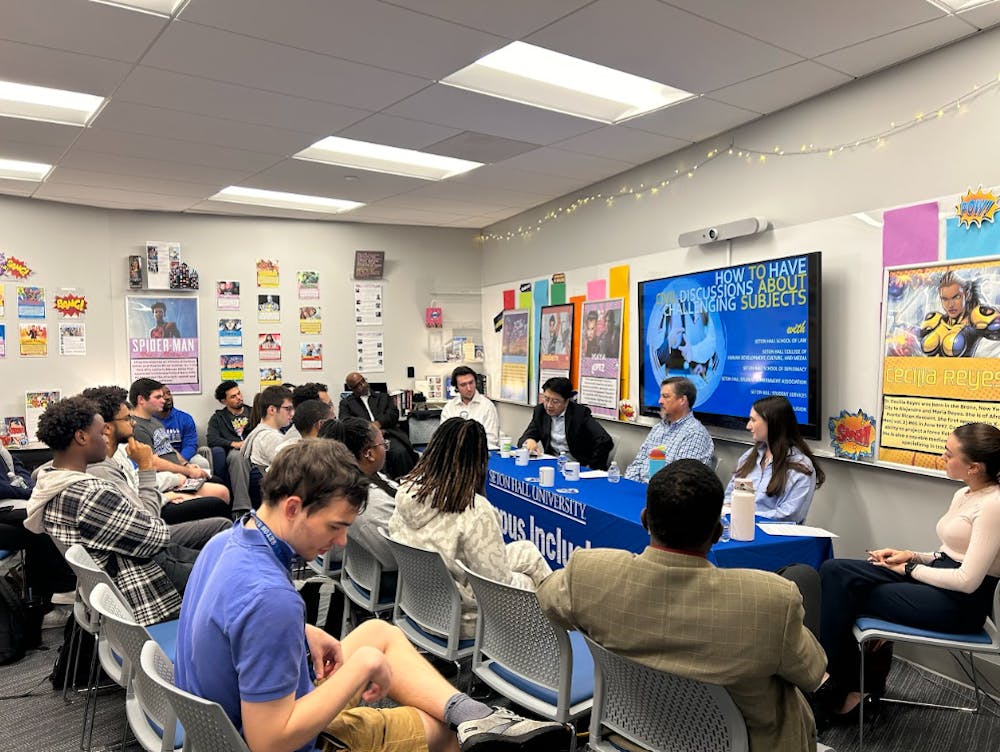The Student Government Association and Campus Inclusion hosted a panel discussion on the importance of having civil discussions on Thursday, Oct. 10.
The panel covered a wide variety of topics drawn from each panelist’s unique background of study, ranging from law to social media, to international relations.
The panelists in attendance were Dr. David Opderbeck, a law professor; Dr. Jess Rauchberg, an assistant professor of communication technologies; and Dr. Zheng Wang, a professor and director of the Center for Peace and Conflict Studies. Student moderators included Arianna Salazar, a senior diplomacy major; Nicholas Parmi, a senior accounting and economics major; and Ghana Hylton, the director of the Campus Inclusion Center.
Salazar said she wanted to participate as a moderator to openly discuss how to navigate difficult conversations and ease tensions, especially for Gen Zers.
“I felt that for our generation it was important to address these ‘tough discussions’ and how to have them, especially with social media playing an important role as to how we get that information,” Salazar said.
Alexandra Carroll, a diplomacy and international relations major, said she attended the event because of a class she recently took with Dr. Wang where she wanted to learn more about cross-cultural communication.
“Ever since I had a class with Professor Zheng Wang about cross-cultural communication last semester, I’ve been really interested in communication across different cultures,” Carroll said.
Before the panel began, Hylton made a note that the discussion was a safe space and free from judgment, per the Campus Inclusion Center guidelines.
Moderators gave each panelist a question to answer in their field of expertise.
The moderators asked Wang the first question: “How do global issues impact discussion on campus and in the classroom?” To this, he emphasized the importance of each person’s perspective.
He talked about his previously hosted conference, “All Conflict is Local,” which allowed people to communicate their first-hand experiences navigating conflicts, such as war, violence, and other struggles.
The moderators then shifted to ways to reduce tension when conversing with those who disagree.
Rauchberg explained how memes, though may seem simple, can have a profound impact on the way people view hard topics.
“I think memes are a really great tool to make sense of what is happening even if they are really absurd or silly or random,” Rauchberg said. “It's a way to kind of unpack, release, and use humor as a tool that allows us to have a moment, have a laugh, and maybe start to talk with each other a little bit more.”
Alternatively, Opderbeck suggested mirroring as a tool to use when the conversation gets too heated.
According to the Berkeley Well-Being Institute, mirroring is the deliberate imitation of someone else’s gestures and speech to build a connection. In this instance, it can be used to reflect an understanding of someone else’s perspective.
As the discussion progressed, the challenges that arrived when engaging in hard conversations arose.
Salazar said that not going into a discussion with an open mind can be unproductive.
“I think the biggest challenges people tend to face when discussing these difficult topics is being open-minded to hear someone’s opinions or views without smacking it down in disagreement,” Salazar said. “I’ve been guilty of wanting to be right and being competitive with my answers, and I believe that’s something that affects us from listening to what the other person or people say.”
Another obstacle is misinformation online that can spread quickly and influence mindsets. To this, the answer is being more inquisitive.
“It’s ok to ask questions,” Rauchberg said. “I think when we get complacent with ‘this is just how it is,’ that leads us down a dangerous path.”
As the discussion ended, each panelist and moderator said they hoped those in attendance could walk away from the event with a new perspective. Salazar emphasized the prevalence of the topics discussed in everyday life.
“I hope that the attendees realize that having these conversations [is] an important part of life and being able to navigate them, although difficult, are necessary to our growth as college students who will be entering the workforce and world,” Salazar said.
On the other hand, Rauchberg focused not only on face-to-face conversations but those online ones too.
“Our current political climate, at times, can be divisive,” Rauchberg said. “Really figuring out how to talk to each other is important. But it’s not just face-to-face conversation, I think it’s also important that we’re thinking about how to talk to people in digital spaces too.”
As an attendee, Carroll said she is going to take the importance of civility, even when exchanges become argumentative.
“I think being able to sit down and put aside our first reactions to things that we hear will do us a lot of good,” Carroll said.
Kaelyn Blizard is a writer for The Setonian’s Campus Life section. She can be reached at kaelyn.blizard@student.shu.edu.





